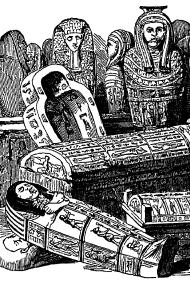
If your first reaction to reading the title of this piece was, “Since when are dictionaries brainstorming tools?!”, you obviously haven’t heard the news. Dictionaries are in fact excellent brainstorming tools, and I’ve been using them in that capacity for years; They are an essential part of my creative ideas arsenal. To find out more about the specifics I suggest you go over and read my article describing some techniques for brainstorming with a dictionary.
Once you recognize the fact that dictionaries are an excellent resource for coming up with new ideas, I would like to go further and convince you of the fact that the good-old traditional dead-tree paper dictionary is a more effective tool in idea generation than all its modern digital counterparts. I can see some of you clutching on to your CD drives and broadband modems protectively, but stick around and let me tell you why the printed paper dictionary can be more fruitfully employed in the creative ideation process.
What it comes down to is the three Ss, and for all you fellow graphics nuts out there, no, it has nothing to do with Sub Surface Scattering. Old-fashioned paper dictionaries have three important properties, or features if you like, that make them more effective brainstorming tools. They work better because they are:
- Sensual
- Slow
- Sequential
1] Sensual
 Dictionaries are sensual in the original and broader sense of the word — they engage our various human senses. Paper dictionaries are physical objects made of largely organic materials that show signs of age. By the very nature of their production, they provide a much richer sensory experience than a digital publication. You might think a multimedia video presentation is a better sensory experience than flipping through a brick of a book, but those two things are very different and I will explain how.
Dictionaries are sensual in the original and broader sense of the word — they engage our various human senses. Paper dictionaries are physical objects made of largely organic materials that show signs of age. By the very nature of their production, they provide a much richer sensory experience than a digital publication. You might think a multimedia video presentation is a better sensory experience than flipping through a brick of a book, but those two things are very different and I will explain how.
Multimedia is an often distracting and attention grabbing medium of information. That is as it should be and it is not a short coming per se, but in the realm of idea generation, sensory distractions are not helpful. The kind of situation which lends itself to creating new ideas is the kind where all or most of your senses are engaged but at a more subconscious level. This leaves your active mind free to wander and stumble upon the answers and notions it seeks. Flipping through a paper dictionary provides exactly this sort of experience. You have the rustling of the pages, the scent of the ink and glue, the yellowing paper, and the touch of the sheets (and of the letters themselves in older printed matter) on your finger tips. All this you experience but usually don’t notice. That thought process and reverie that you sink into while coaxed along by all these sensory perceptions can be a perfect mental state for coming up with new ideas.
2] Slow
 Ideas are like a fine dust floating in the bright sunlight that pierces down through a window in your mind. The only way to capture the idea is to let it settle. If you jump around too much trying to capture the floating dust, you will never get a hold of it. Stillness of mind and thought encourages ideas to “settle”, whereas information overload would drive them away.
Ideas are like a fine dust floating in the bright sunlight that pierces down through a window in your mind. The only way to capture the idea is to let it settle. If you jump around too much trying to capture the floating dust, you will never get a hold of it. Stillness of mind and thought encourages ideas to “settle”, whereas information overload would drive them away.
The physical nature of a paper dictionary enforces a slow browsing pace. When the text says “also look at …”, you can’t simply click on the word and be magically transported to your destination. Unlike the near-instantaneous response times of the digital media, finding anything in a paper dictionary requires a journey, a process, and every process takes time. We of the digital age might consider these wasted seconds, but in truth these seconds of concentrated blankness are often when the information that you are absorbing is allowed to settle and form its new and unique patterns on your mental floor. It is through this process of calm consideration that new ideas are formed.
3] Sequential
 While I have encouraged some random play in my previous article, one of the strengths of a traditional dictionary is that browsing through it can never be a completely random process. The physical aspect of the dictionary enforces order and structure. Since our languages all started with a phonetic base, the alphabetic arrangement of words in dictionaries often leads to related words and words with a common heritage being listed in close proximity. Finding such relationships can often be the key to finding new creative angles to a story or subject.
While I have encouraged some random play in my previous article, one of the strengths of a traditional dictionary is that browsing through it can never be a completely random process. The physical aspect of the dictionary enforces order and structure. Since our languages all started with a phonetic base, the alphabetic arrangement of words in dictionaries often leads to related words and words with a common heritage being listed in close proximity. Finding such relationships can often be the key to finding new creative angles to a story or subject.
The element of chance and the kind of total randomness in browsing that is achievable in digital media (such as Wikipedia) can be stimulating but stronger ideas often involve seeing a connection between things rather than seeing random elements in isolation. The sequential nature of a paper dictionary often helps the mind find such lost connections and relationships between ideas. This physical sequence of words also means placement of words in multiple columns, where close and sometimes not so close neighbours in phonetics often end up printed right next to each other. This controlled randomness can lead to some of your most serendipitous discoveries and some of your best ideas.
Brainstorming and idea generation is not an exact science and it is definitely not a matter of simple formulas of input and output. Truly great ideas require a certain something that goes beyond facts, a bit of inspiration, and often a huge leap of logic. This very inexactness of the process is what makes the paper dictionary an ideal companion for the idea seeker.
When you are flipping through the slightly inexact listings in a traditional dictionary you are encouraging your subconscious to take those leaps of logic and to make those brave and unique connections, while your senses are entertained by the physicality of the process. You could argue that similar results can be gotten with digital media such as online dictionaries or reference material on CD, but it is not just a nostalgia trip when I say that with paper dictionaries, you are working with the grain of how your mind works rather than against it. Make use of these similarities and use your humble paper dictionary to kick start or improve your brainstorming sessions. Your inspired ideas will never complain about the results.
Liked this article? Please share it: ![]()
![]()
![]()
![]()
![]()
![]()



Hmmmm I better go get a dictionary!!
It made me think of my partner and her course readings at university. Some of her courses offer all the readings online but of course she and many other students still choose to print these out before reading. The physical substance definitely makes things seem more substantial and sometimes more meaningful.
There are still many (possibly the majority), who will sympathise with your partner’s choice, Forest.
Beyond any possible nostalgia for the paper medium, the monitor and the desktop, or laptop, have simply not reached the level of comfort in a physical sense as that achived by the humble dead-tree book. And even more so than normal reading, the process of brainstorming requires maximum comfort for the ideas to flow freely.
Digital books are often said to be the future because of their “convenience”. As far as I’m concerned until better devices for reading digital material are invented (I have high hopes for digital paper) digital books are highly inconvenient: power issues, form-factor issues, eye-strain issues, the list goes on.
I have no doubt we will some day soon have a great digital solution which might wean us away from the paper book to a large extent. I’m just not convinced the current technology is close to that solution.
There’s an interesting discussion of this by users over at Slashdot: eBooks – What’s Holding You Back?
As is characteristic of Slashdot, there’s a lot of noise on that page, but some interesting points and points-of-view are hidden in the mess. 🙂